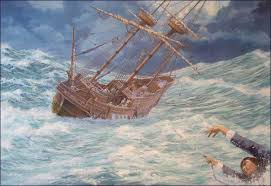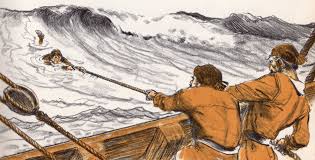
|
John Howland An Illustration of the Providential Care of God |
The Bible tells us that stormy winds fulfill God’s Word (Ps. 148:8). There were many stormy winds encountered in the year 1620 by the 102 passengers on the Mayflower (not including the 20-30 crewmen) during their dangerous journey which lasted over two months (about 65 days)! There was a near death experience which took place on this trip that was fascinating. One of the passengers, John Howland, fell overboard during stormy weather, and against all odds, he managed to survive.
God is sovereign. He "worketh all things after the counsel of His own will" (Eph. 1:11). He rules over the affairs of men, down to the minutest detail. Even Benjamin Franklin made this statement, "I have lived, Sir, a long time and the longer I live, the more convincing proofs I see of this truth -- that God governs in the affairs of men. And if a sparrow cannot fall to the ground without his notice, is it probable that an empire can rise without his aid?" (Address given to the Constitutional Convention, June 28, 1787 in Philadelphia) A thousand years before the event, God predicted that the Romans would gamble for Christ's robe (see Psalm 22:18 with John 19:23-24) and that His hands and feet would be pierced (Psalm 22:16). Seven hundred years before the event, God predicted that the Messiah would be born in the insignificant town of Bethlehem in the land of Judah (Micah 5:2 and compare Matthew 2:1-6). These predictions were precisely fulfilled because God knows the end from the beginning (Isaiah 46:9-10), and He controls the events and circumstances of life.
God is omniscient. He knows all about every person on earth. He knows our life history before it even happens. He knows the very day of our death and the circumstances which will cause it. If one sparrow cannot fall to the ground and die without God's knowledge and consent (see Matthew 10:29), how much more does He know about our living and dying.
John Howland was one of the 102 passengers on the Mayflower. Only two people died during the voyage; Howland came very close to being a third fatality. The passengers were told to stay below, especially during storms, but conditions were not pleasant. During one violent storm some of the Pilgrims were vomiting, the stench was terrible and Howland decided he had to go up to the deck. This decision would almost be fatal. Something caused Howland to fall overboard into the cold Atlantic waters. Perhaps the ship was hit by a great wave at that moment and he lost his balance. However it happened, it seemed highly improbable that he could ever survive the storm tossed sea.

Another historian describes this same remarkable rescue:
As the weather worsened, Master Jones [the ship's captain] ordered that in heavy seas all passengers must remain below decks. In spite of orders, young John Howland ventured out on the main deck in the midst of a violent gale. A great wave struck the ship and pitched him into the raging sea.
"Man overboard!" The shout was lost in the roar of the storm as the yellow head of John Howland disappeared in the furious waters. And then the incredible happened. As Howland went down, his hand grasped the end of a rope that trailed over the ship's side. When the ship rose on the next wave, Howland, clinging desperately, was swung against the ship's side. In a moment a boat hook had been thrust through his leather jacket, and he was hauled over the rail to safety. It was the hand of God that reached out and saved him, said every Pilgrim on the "Mayflower." [James Daugherty, The Landing of the Pilgrims, in the famous Landmark Books series, Random House, 1950, pages 43-44]
William Bradford, in the only primary source account of the Mayflower voyage, mentions the incident:
In sundry of these storms the winds were so fierce, and the seas so high, as they could not bear a knot of sail, but were forced to hull, for divers days together. And in one of them, as they thus lay at hull, in a mighty storm, a lusty young man (called John Howland) coming upon some occasion above the gratings, was, with a seele of the ship thrown into the sea; but it pleased God that he caught hold of the topsail halyards, which hung overboard, and ran out at length; yet he held his hold (though he was sundry fathoms under water) till he was hauled up by the same rope to the brim of the water, and then with a boat hook and other means got into the ship again, and his life saved; and though he was something ill with it, yet he lived many years after, and became a profitable member both in church and commonwealth.
Based on this account, several observations can be made. 1) The storm was significant. Bradford describes it as "a mighty storm." The waves must have been raging. 2) He was "thrown into the sea." It was not a suicide, but something caused him to fall overboard, though Bradford does not specify what it was. 3) Against all odds, he "caught hold of the topsail halyards." In sailing, a halyard is a line or rope that is used to hoist a sail. In this storm the rope happened to be trailing the ship and Howland was in the right place at the right time to grab hold of this rope, which was his only hope for survival. 4) He "held his hold." He was able to hang onto the rope even though he was dragged under the water for a time. 5) The crew was able to use a boat hook and other means to pull him back into the ship. 6) Even though rescued, he was not free from danger. Due to his exposure to the cold water, he was ill for a while, but eventually recovered. 7) Bradford did not consider Howland merely a lucky guy. Instead he attributed his rescue to the Lord: "It pleased God that he caught hold of the topsail halyards." Bradford knew that this man's fate was in the Lord's hands, and God was pleased to let him live.

John Howland lived to be 80 years old, and outlived almost all of the other Pilgrims. A few years after the Mayflower journey, he married Elizabeth Tilley (who also had crossed the Atlantic on the Mayflower). They had ten children and 88 grandchildren. They were responsible for one of the largest groups of Mayflower descendants. Here are some of their famous descendants, none of which would have existed if Howland had perished in the ocean:
|
Presidents |
|
|
Franklin D. Roosevelt |
|
|
George H. W. Bush |
George W. Bush |
|
First Ladies |
|
|
Edith Roosevelt |
Barbara Bush |
|
Governors |
|
|
|
|
Needless to say, American history would have been very different if John Howland had not survived his journey across the Atlantic!
The literary world would not have been the same either, because poets Ralph Waldo Emerson and Henry Wadsworth Longfellow descended directly from Howland's line.
Joseph Smith, the founder of the Latter Day Saint movement, and Brigham Young, early Mormon leader were also his notable descendants. If Howland had perished in the ocean, there would not have been a Mormon church! Remember, God allows false doctrine to test His people (1 Cor. 11:19).
Actors Humphrey Bogart, Alec Baldwin (along with his brothers) and Chevy Chase also are among Howland's notable descendants.
John Howland had two brothers who also came to New England (though not on the Mayflower), namely Henry Howland (an ancestor to both Presidents Richard Nixon and Gerald Ford) and Arthur Howland (an ancestor to Winston Churchill). So in this one family, these three brothers were the ancestors of five American presidents and one of the most esteemed Prime Ministers of England.
God controls all the events of history, and all the circumstances in the life of every individual. We can cast all of our care upon Him, because He cares for us (1 Peter 5:7). It is our privilege to trust every day of our life to His care: "Trust in the Lord with all your heart and lean not unto your own understand; in all thy ways acknowledge Him and He shall direct thy paths" (Proverbs 3:5-6). Do you know the Lord Jesus Christ as your personal Saviour?
"And this is life eternal, that they may know Thee, the only true God, and Jesus Christ whom Thou hast sent" (John 17:3).
History marks its famous people, its kings and presidents and governors and prime ministers, but God is concerned about every person, great or small.
God's Hall of Fame
Your name may not appear down here
In this world's Hall of Fame.
In fact, you may be so unknown
That no one knows your name;
The headlines here may pass you by,
The neon lights of blue,
But if you love and serve the Lord,
Then I have news for you.
This Hall of Fame is only good
As long as time shall be;
But keep in mind, God's Hall of Fame
Is for eternity.
This crowd on earth they soon forget
The heroes of the past.
They cheer like mad until you fail
and that's how long you last.
But in God's Hall of Fame
By just believing on His Son
Inscribed you'll find your name.
I tell you, friend, I wouldn't trade
My name, however small,
That's written there beyond the stars
In that Celestial Hall,
For any famous name on earth,
Or glory that it shares;
I'd rather be an unknown here
And have my name up there.
[This poem was read at Mickey Mantle's
funeral service, by Mantle's dear friend,
Bobbie Richardson]
Additional notes:
1. The reason Howland went to the upper deck is not entirely clear. One account states that he had a message to deliver to one of the crewmen. Other accounts suggest that he came up to get some fresh air due to all the sickness below.
2. The chances of a man overboard surviving in the midst of a violent storm in the frigid Atlantic waters are practically nil. And the Mayflower did not have the capability of making such a rescue in such stormy conditions. If that rope had not providentially crossed his hands he never would have survived.
3. Since there are many people interested in knowing if their ancestors came over on the Mayflower, there has been much study devoted to the family trees of each of the Pilgrims. In light of this, we can be confident that the genealogical information supplied here is accurate. There are major websites devoted to the descendants of John Howland.
|
The Middletown Bible Church |